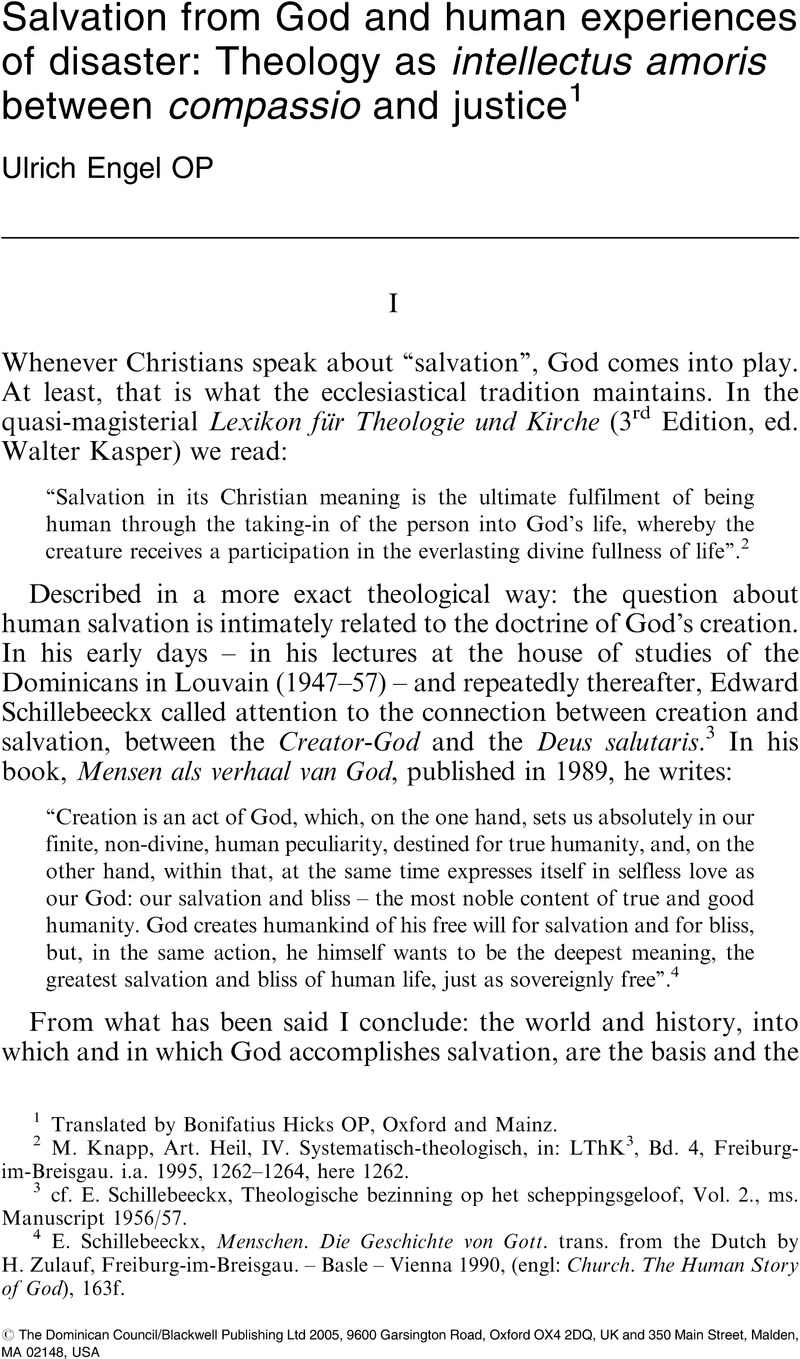No CrossRef data available.
Published online by Cambridge University Press: 01 January 2024

Translated by Bonifatius Hicks OP, Oxford and Mainz.
2 M. Knapp, Art. Heil, IV. Systematisch‐theologisch, in: LThK3, Bd. 4, Freiburg‐im‐Breisgau. i.a. 1995, 1262–1264, here 1262.
3 cf. E. Schillebeeckx, Theologische bezinning op het scheppingsgeloof, Vol. 2., ms. Manuscript 1956/57.
4 Schillebeeckx, E., Menschen. Die Geschichte von Gott. trans. from the Dutch by Zulauf, H., Freiburg‐im‐Breisgau. – Basle – Vienna 1990Google Scholar, (engl: Church. The Human Story of God), 163f.
5 Schillebeeckx, E.., Weil Politik nicht alles ist. Von Gott reden in einer gefährdeten Welt. trans. from the Dutch by Ruh, U., Freiburg‐im‐Breisgau 1987Google Scholar, (Jesus in Our Western Culture: Mysticism, Ethics and Politics, 1987), 19.
6 E. Schillebeeckx, Menschen, op. cit. 35.
7 ibid., 36.
8 cf. Carazo, L. de Sebastián, Europa: Globalisierung und Armut, in: Concilium(D) 37 (2001), 582–589Google Scholar, referring to reports from the European Bank for Reconstruction and Development (London), from Eurostat (Brussels), the Joseph Rowntree Foundation (York, UK), from Caritas Española (Madrid) und the German Federal Government (Berlin).
9 cf. E. Schillebeeckx, Menschen, op. cit., 27–29.
10 ibid., 28.
11 Kennedy, P., Edward Schillebeeckx. Die Geschichte von der Menschlichkeit Gottes(Theologische Profile). trans. from English by Pichler, K., Mainz 1993Google Scholar (engl: Schillebeeckx, 1993), 207 (insertions in brackets by Ulrich Engel).
12 cf. Metz, J.B., Compassion. Zu einem Weltprogramm des Christentums im Zeitalter des Pluralismus der Religionen und Kulturen, in: Metz, J.B./Kuld, L./Weisbrod, A., Compassion. Weltprogramm des Christentums. Soziale Verantwortung lernen, Freiburg‐im‐Breisgau. 2000, 9–20Google Scholar.
13 Margalit, A., Ethik der Erinnerung. Max Horkheimer lectures. trans. from English by Stach, Rainer, Frankfurt‐am‐Main. 2000, 17Google Scholar.
14 J. Sobrino, Theology in a Suffering World. Theology as intellectus amoris, in: P. Knitter/R. Panikkar (ed.), Pluralism and Oppression. Theology in World Perspective(The Annual Publication of the College Theology Society Bd. 34), Lanham 1991, 153–177, here 165.
15 Metz, J.B., Das Christentum im Pluralismus der Religionen und Kulturen(Lucerne University Speeches Vol. 14), Lucerne 2001, 3 (italics: Ulrich Engel).Google Scholar
16 cf. STh II‐II, 30,3.
17 J. Manemann, Kritik als zentrales Moment des Glaubens. Zur gesellschaftlichen Dimension der Fundamentaltheologie, in: K. Müller, Fundamentaltheologie, Regensburg 1998, 217–241, here 237 (insertions in brackets: Ulrich Engel).
18 Ibid. (insertions in brackets: Ulrich Engel).
19 Derrida, J., Gesetzeskraft. Der „mystische Grund der Autorität”. trans. from French by Düttmann, A. García, Frankfurt‐am‐Main. 1992, 44fGoogle Scholar.
20 Haker, H., „Compassion” als Weltprogramm des Christentums?, in: Concilium(D) 37 (2001), 436–450Google Scholar, here 446.
21 Ibid.
22 Ibid.
23 Bible quotations from The New Jerusalem Bible. 1985 London: Darton, Longman & Todd.Google Scholar
24 Claverie, P., Lettres et Messages d’Algérie, Paris 1996Google Scholar, quoted by Radcliffe, T., Gemeinschaft im Dialog. Ermutigung zum Ordensleben(Dominikanische Quellen und Zeugnisse Vol. 2), Leipzig 2001, 289Google Scholar. On Claverie himself cf. Pérennès, J.‐J., Pierre Claverie. Un Algérien par alliance(L’histoire à vif), Paris 2000Google Scholar.
25 Cf. T. Radcliffe, Gemeinschaft im Dialog, op. cit., 289; cf. Gaudium et spes 4.